Find Optical Spectrum Analyzers
Showing 1 - 15 of 56 results
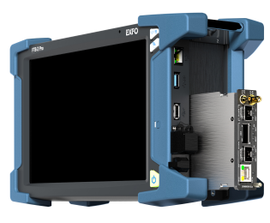
EXFO FTBx-5255-XX
Optical Spectrum Analyzer with Polarization Controller
Rent
Get QuoteUsed
FromLooking For New?
Finance options available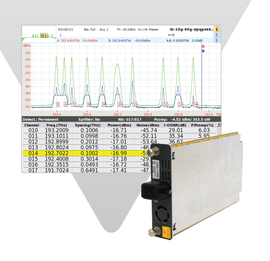
Viavi OSA-110M (2304/91.02)
Full-Band Optical Spectrum Analyzer; 1260 to 1640 nm
Rent
Get QuoteUsed
FromNew
From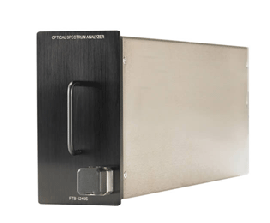
EXFO FTB-5240S-P-XX
Optical Spectrum Analyzer Module; with Polarization Controller OSA
Rent
Get QuoteUsed
FromLooking For New?
Finance options available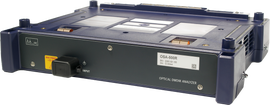
Viavi OSA-500 (2281/91.51)
2281/91.51; OSA-500 High Performance, PC-Version
Rent
Get QuoteUsed
InquireNew
From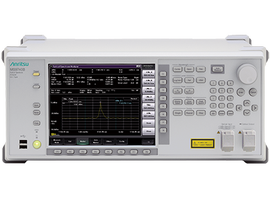
Anritsu MS9740B
Optical Spectrum Analyzer (OSA); 600 nm to 1750 nm
Rent
Get QuoteUsed
InquireLooking For New?
Finance options available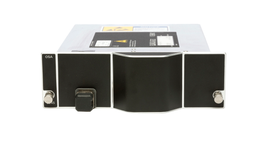
EXFO FTBx-5245-P
Optical Spectrum Analyzer; with Polarization Controller
Rent
Get QuoteUsed
InquireLooking For New?
Finance options available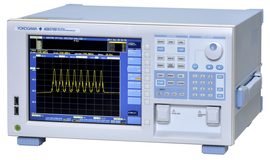
Yokogawa AQ6370D
Optical Spectrum Analyzer; 600 to 1700 nm
Rent
Get QuoteUsed
InquireLooking For New?
Finance options available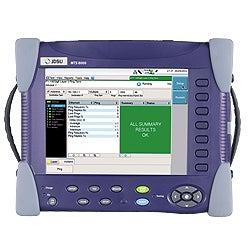
Viavi OSA-500RS (2281/91.67)
2281/91.67; OSA-500RS, APC-Version
Rent
Get QuoteUsed
InquireNew
Call or email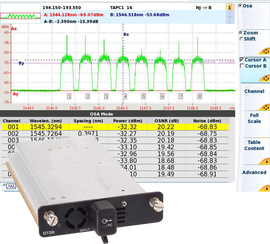
Viavi EOSA610
High Resolution OSA Module with Extended C-Band OSA-610
Rent
Get QuoteUsed
FromLooking For New?
Finance options available
Viavi OSA-500RS (2281/91.57)
OSA-500RS Module, PC Version
Rent
Get QuoteUsed
InquireNew
From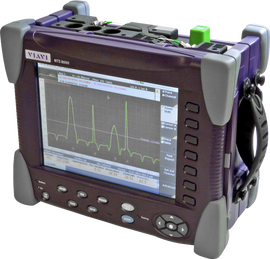
Viavi OSCA-710 (2323/91.11)
OSA-710 Module; Pol-Mux Optical Spectrum Analyzer
Rent
Get QuoteUsed
FromNew
Call or email
Viavi OSA-110R (2304/91.04)
OSA-110R, In-Band OSNR PC version
Rent
Get QuoteUsed
InquireNew
From
Viavi OSA-110R (2304/91.14)
2304/91.14; OSA-110R, in-band OSNR APC Version
Rent
Get QuoteUsed
InquireNew
Call or email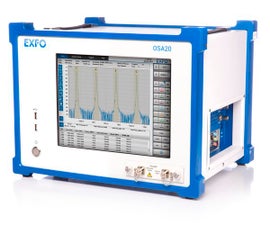
EXFO OSA20-58
Optical Spectrum Analyzer; FC/APC Connector
Rent
Get QuoteUsed
InquireLooking For New?
Finance options available
Viavi OSA-500R (2281/91.55)
2281/91.55; OSA-500R Module, PC-Version
Rent
Get QuoteUsed
FromNew
FromShowing 1 - 15 of 56 results
About Optical Spectrum Analyzers
An optical spectrum analyzer (OSA) is an instrument used for measuring the power, wavelength, and noise characteristics of light signals in an optical fibre. Used in telecommunications, manufacturing, and R&D, optical spectrum analyzers have a variety of applications in designing, developing, testing, and troubleshooting optical communication systems. Because they can identify and measure signal distortion, they are useful in evaluating the network performance of telecommunications systems. They are also used in manufacturing optical components like lasers and optical fibres or in characterizing material properties in research labs.
Here at Electro Rent, we understand the importance of being able to access top quality and accurate optical spectrum analyzers, when and where you need them, without a large capital investment. Depending on your needs and budget, you will find a range of OSAs well suited for your test and measurement applications with flexible financial solutions that allow you to get the most from your budget. From flexible OSA rental to hand selected certified pre-owned devices with discounts, our range is sure to have an option that works for you.
Frequently Asked Questions
How do optical spectrum analyzers work?
Optical spectrum analyzers function by dispersing an optical signal into its separate wavelengths. The instrument measures the intensity of the signal at each wavelength using a detector array and generates a visual representation of the spectrum of the signal.
Using an OSA first involves introducing the signal through the input port such as a fiber optic cable. Inside, the device has a prism or diffraction grating that disperses the light into its separate wavelengths. The detector array measures the power of the signal at each wavelength. The analyzer then displays the power level, wavelength, and sometimes the optical signal-to-noise ratio (OSNR). The spectrum may be viewed as a line or bar graph and will usually be displayed in real time.
How do optical spectrum analyzers differ from RF and microwave spectrum analyzers?
Optical and RF or microwave spectrum analyzers have similar functions in that they measure power in wavelengths, but they measure different frequency ranges and have very different applications.
RF and microwave spectrum analysers are used in TV and radio broadcasting to detect radio frequency interference as well as in aerospace and defense and some telecommunications industries. They are used for the measurement of signals in the frequency range of several megahertz (MHz) to several gigahertz (GHz), and the exact range of frequencies will depend on the model and make of analyzer.
Optical spectrum analyzers are used to measure signal power and noise characteristics of light waves in telecommunications and R&D such as in spectroscopy. These analyzers measure signals in the range of terahertz (THz) and petahertz (PHz), although the range of frequencies will often be limited depending on the intended application of the device.
What should I consider when choosing an optical spectrum analyzer?
One of the key considerations when choosing an OSA is the range of frequencies that the instrument covers. Depending on your application, you may require a wider or more limited range of measurement. The dynamic range (the range of optical power levels) that the analyzer supports is also important to match with your test requirements.
Furthermore, it's important to select an analyzer with the right resolution bandwidth for your needs. If you need to make accurate measurements of small frequency intervals, choosing an OSA with a high resolution is key.
Other considerations include the size and portability of the OSA – both benchtop and handheld spectrum analyzers are available. The analyzer's processing rate may be important, depending on your intended application.
What is the wavelength range of an optical spectrum analyzer?
While the wavelength range can vary between different models of OSA, a typical wide wavelength range is often around 600 nm to 1750 nm.
What are the benefits of buying a pre-owned OSA?
Buying a certified pre-owned optical spectrum analyzer allows you to access quality calibrated test equipment at a fraction of the normal price. Our experts carefully select and evaluate used optical spectrum analyzers in a 23-step certification process to ensure accuracy and reliability. This means you can save on your budget while still being able to use premium-quality devices for all your test and measurement needs. Additionally, our extensive technical support and buyer protections like a one-year warranty mean you can enjoy peace of mind with your pre-owned spectrum analyzer.
Why rent an optical spectrum analyzer?
Renting an OSA means no more delays or downtime with your equipment; you get quick and easy access to the latest technology for as long as you need it. Our flexible rental policy means no ownership costs with your short-term or long-term equipment rental, allowing you to use leading equipment while managing your budget. If you decide to rent an OSA, select your model and get a quote today to enjoy quick and easy delivery.
Want to Know More?
Our Knowledgeable Team of Experts is at Your Fingertips, Ready with Solutions to Address Every Application Challenge.


